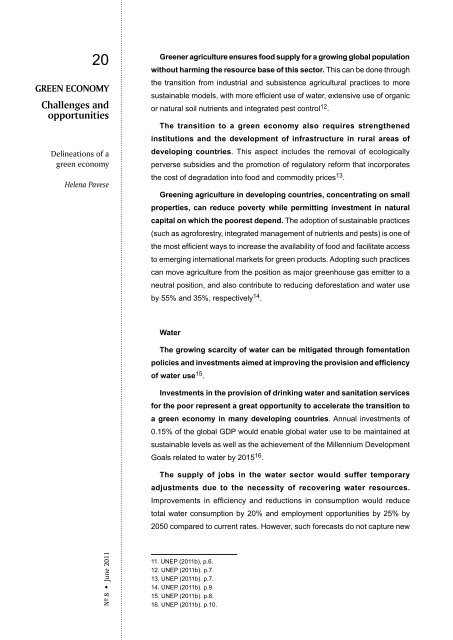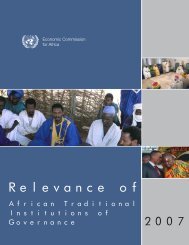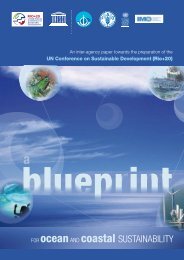Download Publication - Rio+20
Download Publication - Rio+20
Download Publication - Rio+20
Create successful ePaper yourself
Turn your PDF publications into a flip-book with our unique Google optimized e-Paper software.
20<br />
GREEN ECONOMY<br />
Challenges and<br />
opportunities<br />
Delineations of a<br />
green economy<br />
Helena Pavese<br />
Greener agriculture ensures food supply for a growing global population<br />
without harming the resource base of this sector. This can be done through<br />
the transition from industrial and subsistence agricultural practices to more<br />
sustainable models, with more efficient use of water, extensive use of organic<br />
or natural soil nutrients and integrated pest control 12 .<br />
The transition to a green economy also requires strengthened<br />
institutions and the development of infrastructure in rural areas of<br />
developing countries. This aspect includes the removal of ecologically<br />
perverse subsidies and the promotion of regulatory reform that incorporates<br />
the cost of degradation into food and commodity prices 13 .<br />
Greening agriculture in developing countries, concentrating on small<br />
properties, can reduce poverty while permitting investment in natural<br />
capital on which the poorest depend. The adoption of sustainable practices<br />
(such as agroforestry, integrated management of nutrients and pests) is one of<br />
the most efficient ways to increase the availability of food and facilitate access<br />
to emerging international markets for green products. Adopting such practices<br />
can move agriculture from the position as major greenhouse gas emitter to a<br />
neutral position, and also contribute to reducing deforestation and water use<br />
by 55% and 35%, respectively 14 .<br />
Water<br />
The growing scarcity of water can be mitigated through fomentation<br />
policies and investments aimed at improving the provision and efficiency<br />
of water use 15 .<br />
Investments in the provision of drinking water and sanitation services<br />
for the poor represent a great opportunity to accelerate the transition to<br />
a green economy in many developing countries. Annual investments of<br />
0.15% of the global GDP would enable global water use to be maintained at<br />
sustainable levels as well as the achievement of the Millennium Development<br />
Goals related to water by 2015 16 .<br />
The supply of jobs in the water sector would suffer temporary<br />
adjustments due to the necessity of recovering water resources.<br />
Improvements in efficiency and reductions in consumption would reduce<br />
total water consumption by 20% and employment opportunities by 25% by<br />
2050 compared to current rates. However, such forecasts do not capture new<br />
Nº 8 • June 2011<br />
11. UNEP (2011b), p.6.<br />
12. UNEP (2011b). p.7.<br />
13. UNEP (2011b). p.7.<br />
14. UNEP (2011b). p.9.<br />
15. UNEP (2011b). p.8.<br />
16. UNEP (2011b). p.10.

















